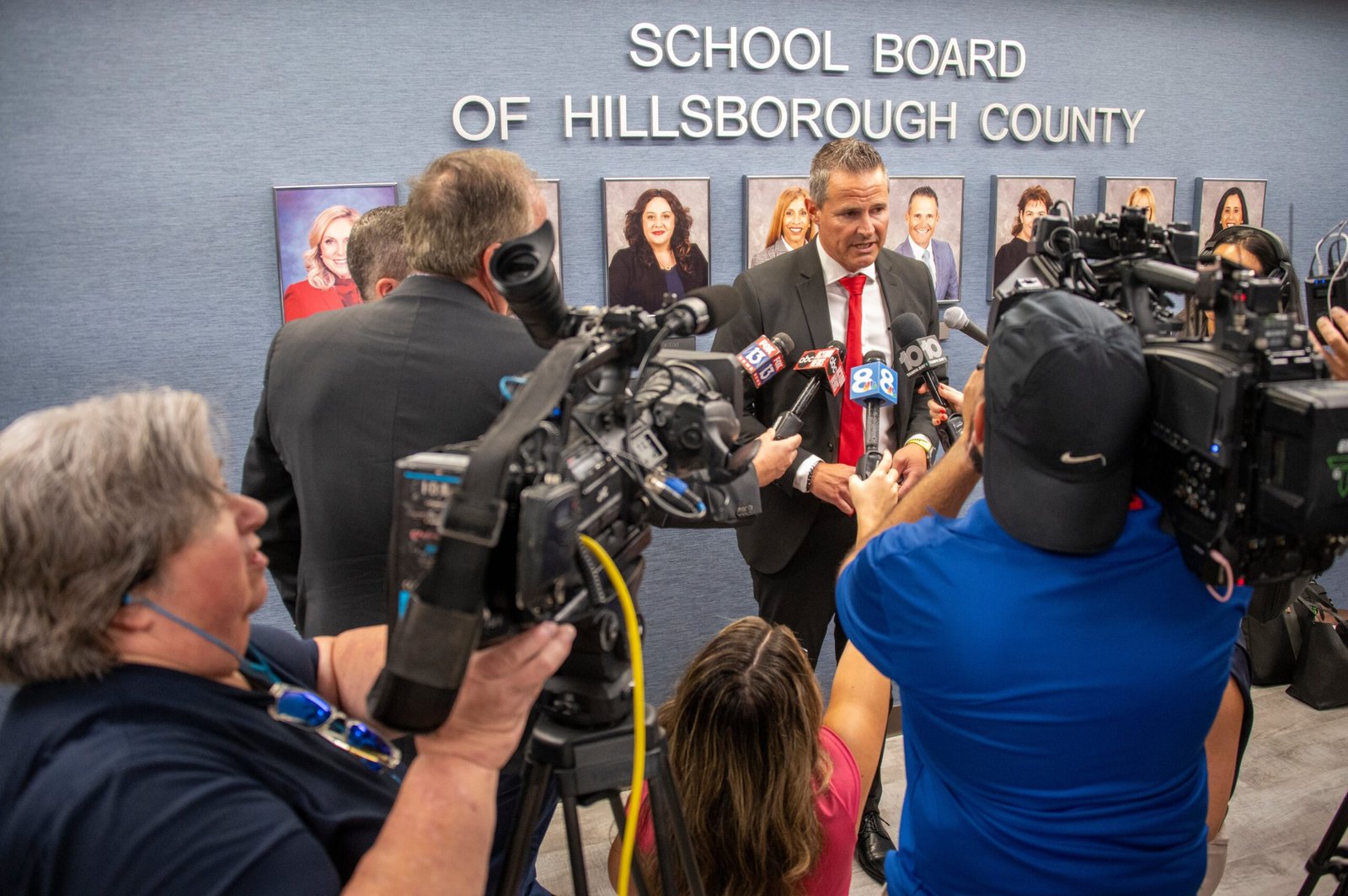The week of Aug. 19 was a good one for the Hillsborough County School District. That Monday afternoon a three-judge panel of Florida’s 2nd District Court of Appeal unanimously rejected a partisan effort by Hillsborough’s Republican-led county commission to strike a tax referendum for teacher salaries from the November general election ballot. The following day, three School Board members who back the tax handily won reelection in the Aug. 20 primary; a fourth who supports the tax placed first in her crowded primary to advance to the November runoff.
Those legal and political victories in a span of 28 hours gave supporters new hope as they ramped up the tax campaign last week. But don’t misread what the courts did and what the voters said. The commission’s lawsuit against the school tax was a stretch from the start, more an act of political sabotage to stoke voter backlash than a legitimate legal claim to halt the referendum. And while voters in the Aug. 20 primary stuck with School Board incumbents, the defining issue in those races wasn’t the tax, but competence, stability and local school control. Many Hillsborough residents who support public education still are struggling with the tax question on the ballot. Sure, they want teachers to earn more. But what’s happening with the money the schools already have?
That tug — between wanting to help without getting fleeced — is the central dilemma many voters face in the Nov. 5 referendum. And it’s why this campaign requires two distinct messages — one justifying a need for higher salaries and another reassuring voters that their money is spent responsibly.
Hillsborough is asking county voters to pass a supplemental property tax for school operations. The additional levy would cost $1 for every $1,000 in taxable property value; the owner of a $375,000 home with a standard $25,000 homestead exemption, for example, would pay an additional $350 per year. The tax would begin July 1 and continue for four years, the maximum term under Florida law before it would have to go before voters for renewal.
Of the $177 million generated annually, the school district would receive about $150 million, while the remaining $27 million would go to privately run charter schools, which are entitled to a share based on enrollment. The district plans to spend more than 90% of its portion to boost employee pay, providing $6,000 supplements to teachers and administrators and $3,000 to bus drivers, cafeteria workers and other support staff. About 8% of the revenue, or $12 million annually, would go to improving school programs, from expanding field trips to boosting college and career counseling.
Hillsborough insists the extra revenue is needed to compete in the growing arms race for teachers. Twenty-five of Florida’s 67 counties already levy an additional property tax for school operations (mostly for teacher salaries), covering the biggest and wealthiest metro areas in the state. Hillsborough is bordered on three sides by counties (Pasco, Pinellas and Manatee) that collect surtaxes for salaries. Teachers, bus drivers and other employees in Hillsborough can easily earn double-digit pay increases merely by crossing county lines.
To put Hillsborough’s disadvantage into perspective, it’s important to look at voting patterns, demographics and real estate.
Spend your days with Hayes
Subscribe to our free Stephinitely newsletter
Columnist Stephanie Hayes will share thoughts, feelings and funny business with you every Monday.
You’re all signed up!
Want more of our free, weekly newsletters in your inbox? Let’s get started.
Nineteen Florida school districts put a combined 20 taxing measures on the 2022 ballot, virtually all aimed at increasing teacher pay. Of the 20 proposed, 19 passed, with Hillsborough’s referendum the sole loser. The outcomes in most cases weren’t close; some counties with existing levies even increased them, reflecting the broad support for raising teacher pay in Florida’s red and blue counties alike.
Hillsborough is an outlier not only for lacking a tax, but for its student-rich, property-poor makeup compared to other Florida metros. Hillsborough is Florida’s third-largest school district, yet smaller districts like Orange and Palm Beach counties have surtaxes to augment salaries, making pay packages in those counties more attractive. And the gap in competitiveness is growing. Other counties have larger property tax bases and faster-growing real estate markets that are cementing their competitive edge.
Of Florida’s five-largest school districts, Hillsborough alone is without a teacher surtax. It also has the smallest property tax base. Hillsborough’s $173 billion in total property value pales compared to Miami-Dade ($510 billion) or Broward ($302 billion), and it’s even less than that of smaller Palm Beach ($332 billion) and Orange ($227 billion) counties. Higher overall property values mean more property taxes collected for schools, as long as everything else is equal including the tax rate.
Those counties not only have more money to play with, but their taxable values are growing faster than Hillsborough’s. Even if its referendum succeeds in November, Hillsborough will still struggle to compete, because the $177 million the tax would generate won’t come near what the similar tax in Miami-Dade ($489 million), Palm Beach ($320 million), Broward ($289 million) or even Orange ($218 million) counties already raise every year.
Given the stakes and the sharp disparities, the surtax might seem an easier sell this election, especially with inflation half what it was in 2022. The district has reduced payroll in recent years, to about 23,400 employees and closed several severely underused campuses.
Many voters, though, still express qualms about Hillsborough’s history of deficit spending. While the payroll is smaller, it’s still larger than the 22,000-member workforce that a consultant recommended in 2020. And while tax supporters won School Board races this year, those campaigns were less about the referendum than cultural issues like book bans and political interference into instruction and governing. In board races this year, numerous candidates on both sides of the referendum called for the school district to be more transparent. Though Hillsborough’s 2022 referendum failed by only 592 votes (out of more than 221,500 cast), candidates opposing the tax in this year’s School Board primary received tens of thousands of votes, reflecting an appetite for austerity from at least some of the electorate.
It’s patently unrealistic to think the district could forgo the tax and magically wring $177 million in savings from the existing budget to put toward teacher’s raises. The political dynamics may have changed from 2022, but the campaign messaging still requires two tracks. Translating what higher pay means to the classroom environment is simple. The district needs to make the case that its workforce and spending are in line with other counties and the times. It also needs to grasp the swelling call for greater openness. Mail ballots for the election go out Oct. 3. This is a narrow window for winning hearts and minds.







